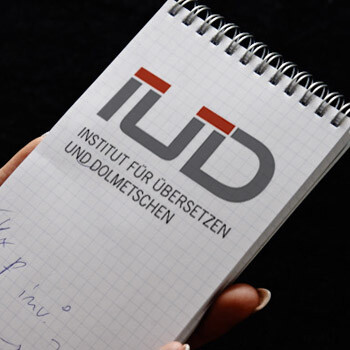Fee & remuneration
Fees of the conference interpreter / project fee
The fee for a professional conference interpreter working as a simultaneous interpreter and/or consecutive interpreter is calculated on a project basis. It rewards the interpreting service provided by the conference interpreter during the assignment. In addition, it pays for the organizational preparation of the assignment (planning of arrival and departure, in the case of online assignments also the preparation of the technical infrastructure), any tests or rehearsals on the day of the event and times when the conference interpreter is on standby. Last but not least, the fee also covers the conference interpreter’s experience, ranging from professional university training and further training measures offered by professional organizations (e.g. professional associations) to the interpreter’s personal further training and education, e.g. in the field of interpreting. via relevant specialist media. For face-to-face events, it is based on a maximum working day of 8 hours including breaks, with the actual interpreting time in the morning and afternoon not exceeding 2.5 to 3 hours each. For online events, it is based on a maximum working day of 6 hours including breaks, with the actual interpreting time not exceeding 2 hours in the morning and 2 hours in the afternoon. The reason for the reduced working day is the much more cognitively demanding work involved in online assignments. It does not matter whether these take place in a professional hub or an interpreter-led hub. Online interpreting assignments of more than 2 hours require adjustments to the team strength of the interpreting team.
Preparation fee
For technically demanding events, the conference interpreter invests in professional preparation. In addition to preparing for the actual speeches, this also includes preparing for the topic of the event. In addition to the actual specialist terminology, precise technical interpretation also requires background knowledge in order to be able to logically classify allusions or specialist knowledge assumed by the speaker. Research is also necessary for recurring events, if only to gain an overview of developments since the last event. In the area of finance, these may be developments in the relevant markets, sectors or financial instruments. In the field of medicine, these are new surgical methods, new products, new techniques or new studies. Depending on the specialist nature of the event, we apply either a factor (based on the interpreter’s own interpreting time) or an hourly flat rate.
Recording fee
If the face-to-face or online event is recorded, the conference interpreter receives a fee for the assignment of his intellectual property rights as defined in the Berne Convention of 1886, an exploitation fee. The amount of the fee depends on the respective exploitation. The use of the interpreting service solely for internal purposes is therefore distinguished on the fee side from reuse (e.g. for seminars or YouTube, etc.). The corresponding amount is determined on an event-specific basis.
Cancellation of assignments as a conference interpreter
If the client cancels the assignment of the conference interpreter, a cancellation fee and the proven costs already incurred by the interpreter will generally be reimbursed. If the conference interpreter is able to reschedule the assignment day with an equivalent assignment after the client has canceled the assignment, the organizer who originally canceled the assignment day will not incur any costs for the cancellation. Cancellation regulations should ensure that the conference interpreter, who works as a freelancer, can plan his working time profitably, i.e. with assignments. It is clear that something can always change in the organizer’s planning. Nevertheless, the conference interpreter, who has kept the relevant day(s) free for the event, must not suffer any loss as a result of the cancellation. This is to be ensured by the above-mentioned cancellation policy.
Arrival and departure time compensation
The conference interpreter shall receive a so-called arrival or departure time allowance for the arrival or departure before or after the event that cannot take place on the day of the event itself, as the interpreter cannot schedule these days for other interpreting assignments due to the arrival on the day before or departure on the day after the event.
Daily allowance or Per Diem
A daily allowance or per diem is the reimbursement of expenses incurred by the conference interpreter because the assignment in question does not take place at the conference interpreter’s professional place of residence. The amount of the daily allowance depends on the location and duration of the assignment. For example, does the conference interpreter have to also eat at the event location in the evening or if the local catering costs are higher than average (e.g. major cities such as Paris, London, San Francisco, New York, etc.), the daily allowance will be adjusted accordingly.
Accommodation
If it is not possible to travel to and from the conference interpreter’s assignment on the same day, the interpreter must stay overnight. There are basically two options here: firstly, the conference interpreter can be booked into the organizer’s hotel contingent at the event hotel; secondly, the organizing interpreter can take over the organization of suitable accommodation. In this case, the organizer will be invoiced for the costs incurred.
Travel expenses
Another item that is paid to the conference interpreter is travel expenses. Depending on the case, there may be costs for traveling by train, car or plane. The costs for travel to and from the event will be covered by the organizer by means of a cost voucher or as a lump sum.








